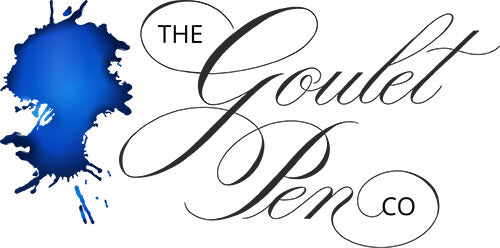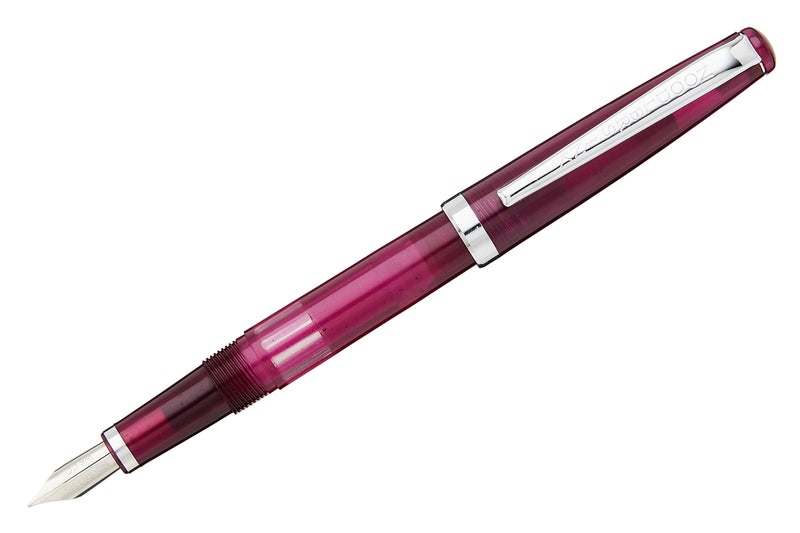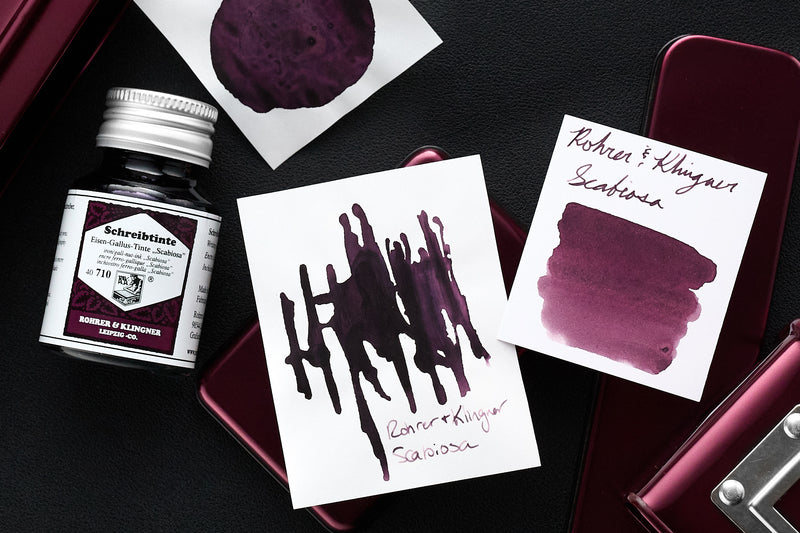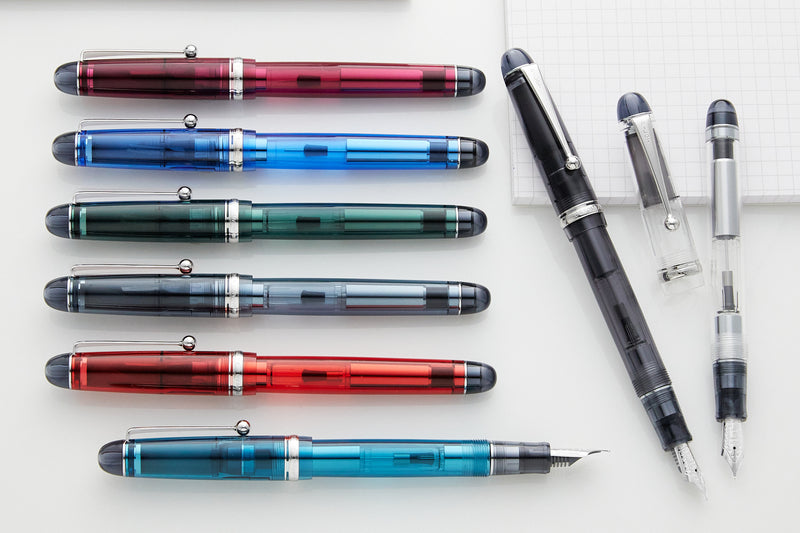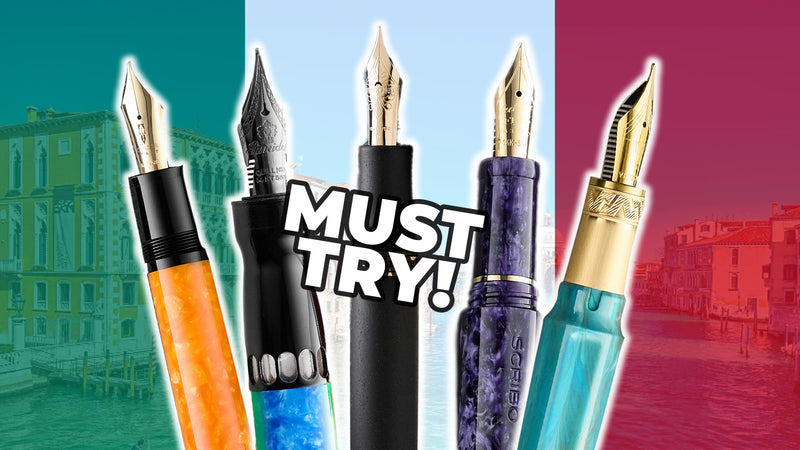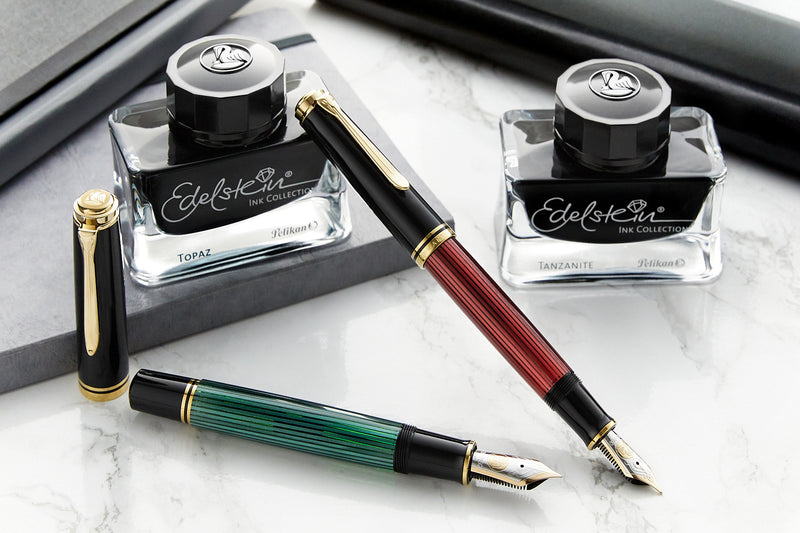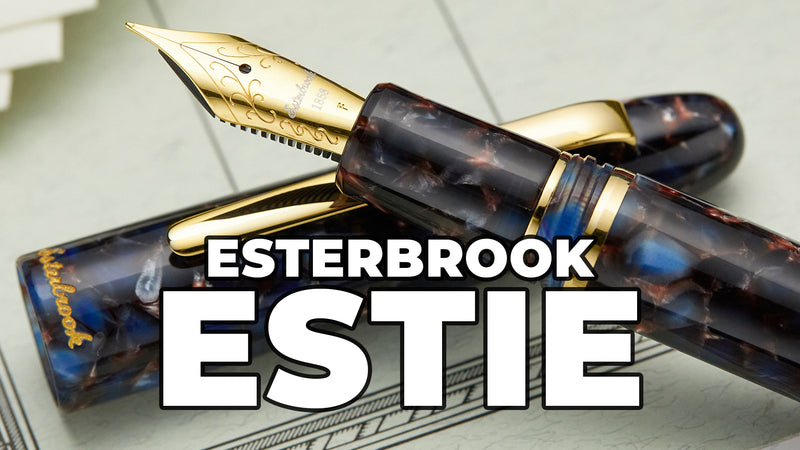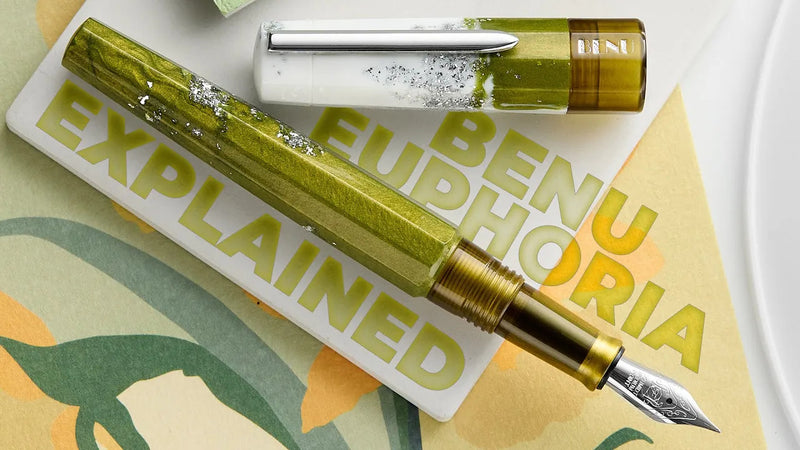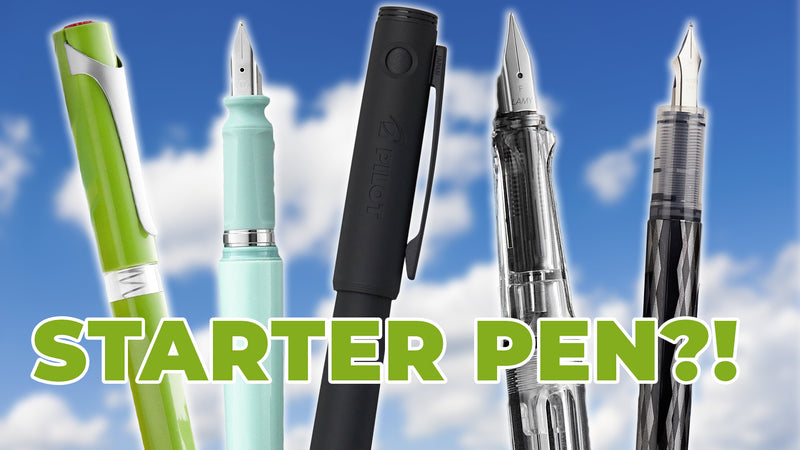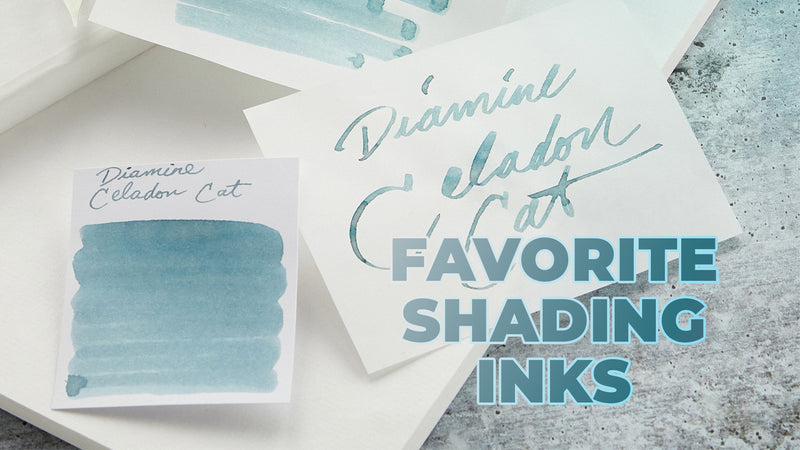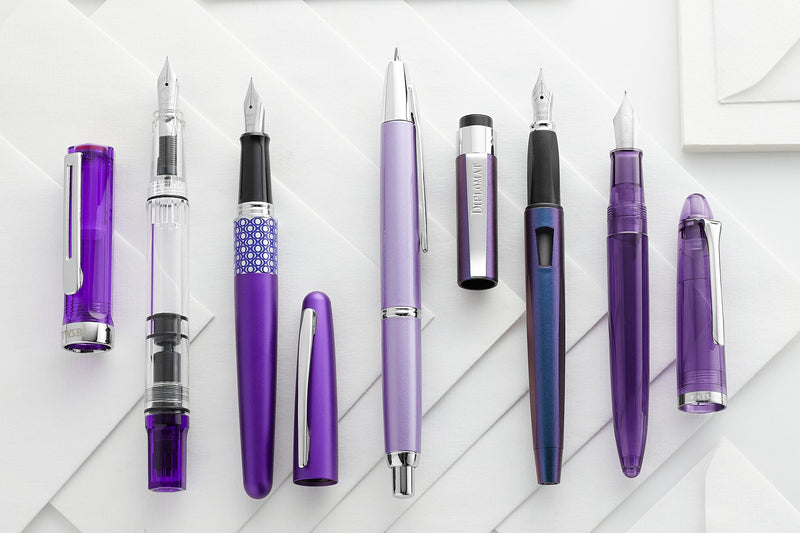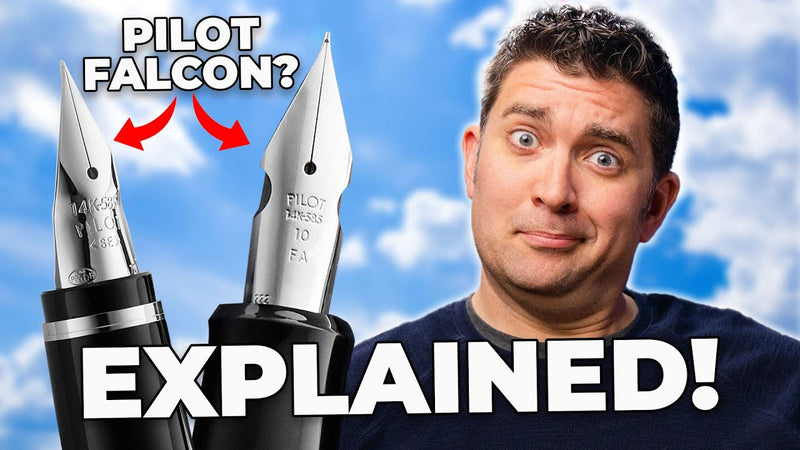This translucent purple demonstrator Noodler's Nib Creaper flex fountain pen features a small, slender body with a steel flexible #2 nib and a twist piston mechanism. A small ink window shows how much ink is left in your pen. These pens are made from a celluloid derivative. The vegetal resin body of this pen may show particles or striations within the material. This is most noticeable in demonstrators and bright colors.
The Nib Creaper (also known as the "Standard Flex Pen") was the first fountain pen produced by Noodler's, introduced in 2010. The Noodler's flex pens were designed for the hands-on tinkerer - they are made to be taken apart and adjusted. The nib and feed pull right out and can be adjusted and heat set for optimal performance. Don't be afraid to get a little ink on your fingers while you learn how to use this pen.
As a simple rule of thumb for writing with a flex pen, just apply slight pressure on your downstrokes, which will spread the tines and increase the line width, achieving that optimal line variation. Make sure to go slowly so that the ink can keep up with your writing. As with any flex pen, it just takes practice!
Due to the residual machining oils used when cutting the feeds for these pens, we highly encourage you to give the pen a good flush before use. We recommend any of the following options: distilled water, water with a touch of dish soap, a pre-packaged pen flush, or a solution of 10% clear ammonia to water. This should resolve most ink flow issues!
Click here to download the printable PDF instruction sheet for the Noodler's Nib Creaper Flex.
- Condition
- New
- Brand
- Noodler's
- Type
- Fountain Pens
- Color
- Purple
- Demonstrator
Whether or not the barrel of the pen is translucent, allowing you to see the ink and filling mechanism inside.
- Yes
- Body Material
- Resin
- Cap Rotations
For pens with a screw-cap closure, how many rotations it takes to uncap/recap the pen.
- 1
- Cap Type
How the cap is opened/closed from the barrel of the pen. Some common options include Snap-Cap, Screw-Cap, Magnetic Cap, or Capless (no cap).
- Screw-cap
- Compatible inks & refills
Which ink this pen will accept. Choices include bottled ink and various styles of pre-filled ink cartridges.
- Bottled ink
- Filling Mechanism
How the pen fills with ink. Click here to watch our video tutorial on common filling mechanisms.
- Piston
- Grip Material
- Resin
- Nib Size
- Flex
- Nib Color
- Silver
- Nib Material
- Steel
- Postable
Whether or not the cap fits securely onto the back of the barrel when open.
- Yes
- Retractable
Whether or not the nib/tip can retract into the body of the pen (usually for click or twist-open style pens).
- No
- Diameter - Body
- 10.7mm (0.4in)
- Diameter - Cap (without clip)
- 12.4mm (0.5in)
- Diameter - Cap (with clip)
- 15.9mm (0.6in)
- Diameter - Grip (mm)
Measured from the place most people choose to rest their fingers, which varies with each pen.
- 7.8mm
- Length - Body
The measurement from the back end of the barrel to the tip of the nib.
- 113mm (4.4in)
- Length - Cap
- 57mm (2.2in)
- Length - Nib
The measured length of the visible portion of the nib when it is installed in the pen, from grip to tip.
- 13.3mm (0.5in)
- Length - Overall (Closed)
- 128mm (5in)
- Length - Overall (Posted)
When the cap of the pen is posted onto the back of the pen body, this is the measurement of the entire pen including the nib.
- 148mm (5.8in)
- Weight - Body
If a converter is included with the pen, this weight is reflected in the total.
- 8g (0.3oz)
- Weight - Cap
- 2g (0.1oz)
- Weight - Overall (g)
- 10.0g
- Max Ink Capacity - Piston Vac
The maximum volume of ink that can fit in the pen when using the built-in piston or vacuum filling mechanism.
- 1.00ml
FAQs about Fountain Pens
How do I fill a fountain pen with ink?
It depends on the pen's filling mechanism, which you can find in the Technical Specs section above.
Here's a quick definition of the most common filling mechanisms:
- Cartridge - A small, disposable, sealed plastic reservoir that holds fountain pen ink. These come pre-filled with ink, and typically you just push to insert them into place and you'll be ready to write! Check out our quick guide here.
- Converter - A detachable and refillable ink reservoir that allows you to use bottled ink in a cartridge-accepting pen. Typically you will install the converter into the grip section, dip the nib/feed into the ink, and twist or pull the converter knob to draw ink into the converter. Here's a video for how to fill a cartridge/converter pen using a LAMY pen as an example.
- Eyedropper - A pen that utilizes the entire barrel as a reservoir for ink. Ink is directly filled into the barrel, allowing for a high ink capacity. Here's a video on how to do it!
- Piston - A type of filling system that uses a retracting plunger inside a sealed tube to draw ink into a pen. They are typically either twist or push-operated. These pens cannot accept cartridges or a converter, and only fill from bottled ink.
- Vacuum - A push-style piston that uses pressure to fill the large pen body with ink. They seal the ink chamber when closed, making it ideal for flying without risk of leaking. Check out our video on how to use a vac filler here.
Check out more info on these filling mechanisms including a video on how to fill each one on our blog.
How do I clean a fountain pen?
It depends on the filling mechanism, but it mostly comes down to flushing it out with water, and sometimes a little bit of Pen Flush if the ink is really stuck.
It's a bit easier to show than to tell, so we've put together a few quick videos showing you the process:
How often do I need to clean my fountain pen?
We recommend a good cleaning every 2 weeks, and any time you change ink colors.
Water will usually do the trick, but we recommend you use our Goulet Pen Flush if the ink has been left in the pen for a while and could have dried up, or when you’re switching ink colors.
My pen won’t write! What do I do?
First things first... make sure you have ink in the pen! Be sure that the ink cartridge or converter is seated properly in the pen, and that you aren't out of ink.
We always recommend you give your pen a good cleaning first, using our Goulet Pen Flush, or a drop of dish soap in some water. New pens often have some machining oil residue left in the feed, so a good cleaning often does the trick first.
If that still doesn't work, try priming the feed. This consists of either dipping your pen nib and feed in ink, or forcing ink from the converter down into the feed.
If it’s still not working after that, please reach out to us so we can help!
What's your return policy?
You can submit a return request within 30 days of your order date. You can read all our Return Policies here.
To initiate a return, please submit a request at the Return Portal. Our Customer Care team might reach out to you for more information.
Please note we are unable to accept a return of any Namiki or Sailor Bespoke fountain pen for any reason once it has been used with ink. Please thoroughly inspect and dry test the pen before use.
